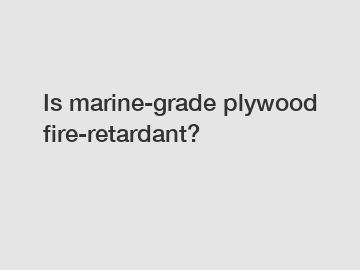Is marine-grade plywood fire-retardant?
Is Marine-Grade Plywood Fire-Retardant?
Marine-grade plywood is a type of plywood specifically designed for use in humid or wet environments such as boats, docks, and other marine applications. It is known for its durability and resistance to moisture, making it an ideal choice for these types of projects. However, when it comes to fire safety, there is some confusion among consumers about whether marine-grade plywood is fire-retardant. In this article, we will explore the characteristics of marine-grade plywood and its fire-resistant properties.
Understanding Marine-Grade Plywood.

Marine-grade plywood differs from regular plywood in that it is manufactured using a waterproof adhesive. This adhesive helps to prevent delamination and ensures that the plywood remains structurally sound even when exposed to moisture for extended periods. Additionally, marine-grade plywood is typically made from high-quality hardwood veneers, adding to its strength and durability.
The fire-retardant properties of plywood, including marine-grade plywood, are determined by several factors, such as the type of wood used, the adhesive, and any additional treatments or coatings. It is important to note that marine-grade plywood is not inherently fire-resistant unless stated otherwise by the manufacturer or subjected to specific fire-resistant treatments.
Fire-Resistant Treatments for Marine-Grade Plywood.
There are fire-resistant treatments available that can enhance the fire-retardant properties of marine-grade plywood. These treatments involve the application of fire-resistant coatings or chemicals to the plywood surfaces. Fire retardants work by slowing down or inhibiting the spread of flames, giving occupants more time to evacuate a structure and reducing the risk of extensive damage.
When using fire-resistant treatments on marine-grade plywood, it is crucial to follow the manufacturer's instructions and recommendations. These treatments may require regular maintenance or reapplication to maintain their effectiveness over time. Therefore, it is important to consult with professionals or industry experts to ensure that the required fire safety standards are met.
Safety Regulations and Compliance.
When it comes to fire safety, it is always advisable to consult local safety regulations and compliance standards for your specific project. Different jurisdictions may have varying requirements for fire safety and resistance, especially in commercial or public buildings. These regulations often specify the type of materials and construction methods allowed to ensure the safety of occupants.
In the case of marine applications, such as boats or vessels, there may be specific regulations and standards related to fire safety. For example, the U.S. Coast Guard enforces specific fire safety requirements for marine vessels, including the selection of fire-retardant materials and the installation of fire suppression systems.
Closing Thoughts.
Although marine-grade plywood is widely recognized for its excellent resistance to moisture, it is not inherently fire-retardant. While fire-resistant treatments can enhance its fire-retardant properties, it is essential to consult the manufacturer's recommendations and any applicable safety regulations. Whether you are using marine-grade plywood for a boat, dock, or any other marine application, prioritizing fire safety is crucial.
If you have further questions or require assistance with selecting fire-resistant materials or treatments for your marine project, please do not hesitate to contact us. Our knowledgeable team is here to help ensure the safety and durability of your marine construction.
The company is the world’s best grey melamine plywood, melamine covered plywood, specialty plywood suppliers supplier. We are your one-stop shop for all needs. Our staff are highly-specialized and will help you find the product you need.


